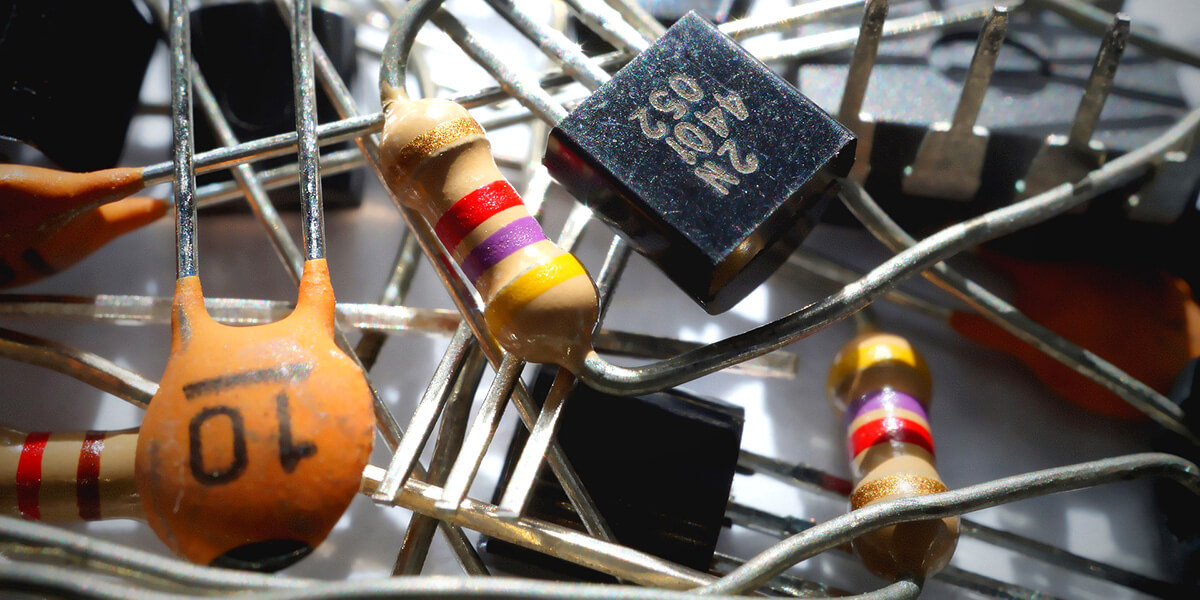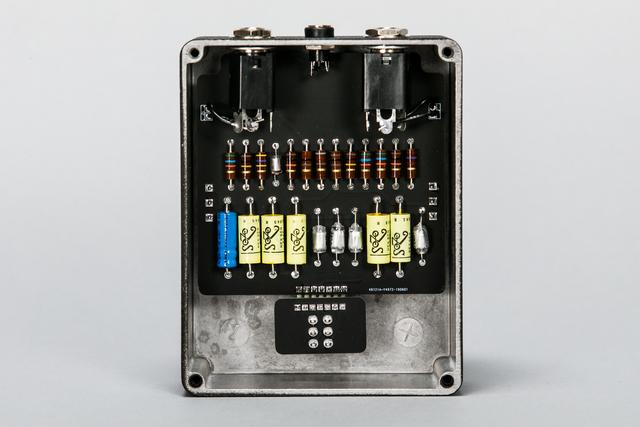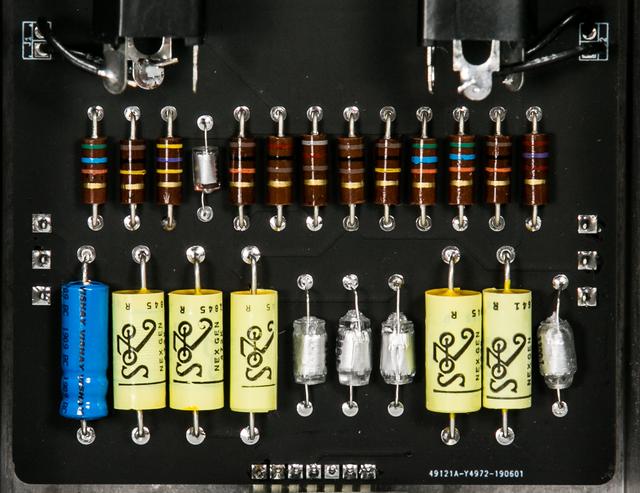Hi, all. From what I am reading on this forum, the capacitors of choice are wima. Well, we have a ton of resistors on these boards, so I started to search for the best types of resistors for our purposes. The brand that I first found is vpg/vishay, who seem to specialize in foil resistors with low TCR, and they have an AUR series that is specialized for audio applications. I didn't see any vendors for them, and they have a form to request quotes. Instead of doing that, I sent their North American contact an email, so we'll see if it's even practical (quantity-wise) for hobbyists to purchase from them. I don't know if the forum does group buys, but I will post their response, if any of you are interested. I searched the forums for any info on these resistors, and there were a few mentions of vishay, but I didn't see anything related to the resistors. Have any of you looked into them before, or even used them? Is this a worthwhile pursuit?
You are using an out of date browser. It may not display this or other websites correctly.
You should upgrade or use an alternative browser.
You should upgrade or use an alternative browser.
Trying to find high-end audio components -- any of you used vishay resistors?
- Thread starter Steve973
- Start date
spi
Well-known member
TBH I don't think guitar pedals need "high-end audio" components. With your standard pedal board, your signal is getting manipulated, overdriven if not completely distorted and fuzzed out, modulated, washed out with reverbs and delays, and then sent to an amp (which probably does not have high-end components) for further processing.
I hear what you are saying, and I mostly agree. Let's take, for example, a situation where you have a pedal that is not meant to distort -- compressor, EQ, splitter, noise gate, etc. -- and you want to go directly into your computer for further processing and recording -- it stands to reason that you might want to start with the best possible (transparent) audio. And I totally get that there is a reasonable limit, especially when we consider the price. On Mouser, I saw those VPG resistors, and they are ridiculously expensive! I also saw that Microchip diodes are about ten times the price of other diodes, but I am not able to tell exactly *why*.TBH I don't think guitar pedals need "high-end audio" components. With your standard pedal board, your signal is getting manipulated, overdriven if not completely distorted and fuzzed out, modulated, washed out with reverbs and delays, and then sent to an amp (which probably does not have high-end components) for further processing.
A big part of my rationale, which is probably very common in this forum, is that I am building the pedal, so I can: 1. learn and gain understanding about the components, including what makes one of the same type different from another, and 2. reasonably choose the best components that I can source for the application. My ADD makes me a bit obsessive when something grabs my attention, and I tend toward the extreme. What would be really helpful is to be able to discern good quality without becoming ridiculous. I would consider it to be a success if I could "level up" the components from what I would get in a pedal produced by a company. This applies even to good companies, like Darkglass, etc.
Paradox916
Well-known member
From my limited experience I have found that high end components don’t really seem to make a difference in tonal quality or clarity but may play a part in longevity of the pedal you build. Checking values and your craftsmanship will play a bigger part in what you are looking to accomplish IMO. Here is a link that I think can answer your questions on where to source quality parts for the best possible outcome.

 aionfx.com
aionfx.com
Hopefully this is helpful

Parts Sourcing: Where to Buy What
After giving a general overview of what stores are out there, it’s helpful to give an overview of parts sourcing from the component perspective—the best place to buy resistors, the best place to buy…
Hopefully this is helpful
jesuscrisp
Well-known member
You are totally overthinking it. Just go with metal Film resistors, Wima MKS2 caps and some quality electrolytics and you'll be more than fine. There literally is no need for anything "better" than that.
For recording it's even less of a deal since: A) even if there is some terribly subtle difference when using the highest possible grade components in a guitar pedal, any sort of nuance will get lost in the mix. B) if you want to go directly into your PC, better do it without a pedal inbetween and just use whatever plugins for the task since you will run it through software anyway.
If you want something to not distort, be it compressors, EQ, or else, better give them more headroom via feeding them more voltage or even integrating charge pumps. Even that is mostly important with circuits where you either want to amplify your signal with a lot (not great for running into an audio interface) or if you are playing really high output pickups.
For recording it's even less of a deal since: A) even if there is some terribly subtle difference when using the highest possible grade components in a guitar pedal, any sort of nuance will get lost in the mix. B) if you want to go directly into your PC, better do it without a pedal inbetween and just use whatever plugins for the task since you will run it through software anyway.
If you want something to not distort, be it compressors, EQ, or else, better give them more headroom via feeding them more voltage or even integrating charge pumps. Even that is mostly important with circuits where you either want to amplify your signal with a lot (not great for running into an audio interface) or if you are playing really high output pickups.
TravisM
Active member
I have used Vishay and could not tell any difference between them and any other brand as long as they are within spec.
1% metal film resistors should be fine. If you want to be extra careful about it, measure every component to get as close as possible to the intended value for the component, but know that the person who designed the circuit made compromises in the design anyway, sometime based on cost and availability, so a circuit 'as designed' may already be sub-optimal. You can spend your OCD time more wisely in making sure the solder joints are good, the board gets cleaned after you solder and the offboard wiring is tidy.
1% metal film resistors should be fine. If you want to be extra careful about it, measure every component to get as close as possible to the intended value for the component, but know that the person who designed the circuit made compromises in the design anyway, sometime based on cost and availability, so a circuit 'as designed' may already be sub-optimal. You can spend your OCD time more wisely in making sure the solder joints are good, the board gets cleaned after you solder and the offboard wiring is tidy.
Last edited:
fig
Village Idiot
I use Dale/Vishay MIL-spec resistors a good bit, but not for the purpose of enhancing sound quality. I prefer the beefy leads and I like to pack my builds with mojo components. It's mostly for aesthetics though. I will take a stand on cap-type in the audio path, and semiconductors are another story.
vigilante398
Authorized Vendor
Just PM'd you with some stuff to check out. #2 there is a big deal, always look at application and what you're trying to accomplish. If you're building a fuzz, you don't care much about component quality, you're just going for dirt anyway. If you're building a boutique studio compressor, absolutely obsess over every single component and how they interact with everything else in the circuit.A big part of my rationale, which is probably very common in this forum, is that I am building the pedal, so I can: 1. learn and gain understanding about the components, including what makes one of the same type different from another, and 2. reasonably choose the best components that I can source for the application.
I am not exactly what you might call neurotypical. So, I can agree with you in spirit that I am overthinking. But it's not as simple as flipping a switch for me. This is part of who I am. I need to obsessively dive in and understand as much as possible in the shortest amount of time. Both the positive and very-slightly-negative comments help with my learning. I appreciate all of these perspectives.You are totally overthinking it. Just go with metal Film resistors, Wima MKS2 caps and some quality electrolytics and you'll be more than fine. There literally is no need for anything "better" than that.
pcb rookie
Active member
Just PM'd you with some stuff to check out. #2 there is a big deal, always look at application and what you're trying to accomplish. If you're building a fuzz, you don't care much about component quality, you're just going for dirt anyway. If you're building a boutique studio compressor, absolutely obsess over every single component and how they interact with everything else in the circuit.
vigilante398 I would also be interested with that stuff to check out. If you wish to PM me as well, that would be great!
Last edited:
pcb rookie
Active member
Ok ... i'm no expert but I don't think that quantity 1% film resistors, Wima MKSII Caps and quality Nichicon or panasonic when Electrolytic caps are required is making a compromise ... to my knowledge they are not consolation prize components. Somebody correct me if I'm wrong ... no offence!I am not exactly what you might call neurotypical. So, I can agree with you in spirit that I am overthinking. But it's not as simple as flipping a switch for me. This is part of who I am. I need to obsessively dive in and understand as much as possible in the shortest amount of time. Both the positive and very-slightly-negative comments help with my learning. I appreciate all of these perspectives.
The article that Paradox916 recommended was very helpful for me on sourcing my components.

Parts Sourcing: Where to Buy What
After giving a general overview of what stores are out there, it’s helpful to give an overview of parts sourcing from the component perspective—the best place to buy resistors, the best place to buy…
I'm also looking to integrate some Vishay res in some of my builds but as Fig said above, it's only for mojo visual and aesthetics.
spi
Well-known member
I think the best way is to settle this in your mind is to conduct a scientific experiment: build a compressor with both cheapo tayda components, and one with high-end parts, then have a blind sound test.I am not exactly what you might call neurotypical. So, I can agree with you in spirit that I am overthinking. But it's not as simple as flipping a switch for me. This is part of who I am. I need to obsessively dive in and understand as much as possible in the shortest amount of time. Both the positive and very-slightly-negative comments help with my learning. I appreciate all of these perspectives.
I'd certainly be interested in hearing the results.
Paradox916
Well-known member
Nothing wrong on wanting it to look nice….that’s half the fun.Ok ... i'm no expert but I don't think that quantity 1% film resistors, Wima MKSII Caps and quality Nichicon or panasonic when Electrolytic caps are required is making a compromise ... to my knowledge they are not consolation prize components. Somebody correct me if I'm wrong ... no offence!
The article that Paradox916 recommended was very helpful for me on sourcing my components.

Parts Sourcing: Where to Buy What
After giving a general overview of what stores are out there, it’s helpful to give an overview of parts sourcing from the component perspective—the best place to buy resistors, the best place to buy…aionfx.com
I'm also looking to integrate some Vishay res in some of my builds but as Fig said above, it's only for mojo visual and aesthetics.
Betty Wont
Well-known member
I've done a similar experiment with MLCC vs Wima film caps in pedals. I found no audible differences.I think the best way is to settle this in your mind is to conduct a scientific experiment: build a compressor with both cheapo tayda components, and one with high-end parts, then have a blind sound test.
I'd certainly be interested in hearing the results.
Paradox916
Well-known member
Damn that could shave off a few bucks for sure.I've done a similar experiment with MLCC vs Wima film caps in pedals. I found no audible differences.
fig
Village Idiot
On the other hand, much respect to folks like @Betty Wont , @vigilante398 , and others who have built and sold tons of pedals. There is an economy involved with that, and since 99% of "mojo" is indiscernible, their reasoning is very sound!
That's the difference with me. I only build for myself and to give to my son or anyone who feigns interest in having one, LOL!
I think I'd have fun doing a Fig's Bench experiment on the subject. Certainly I can find some way to explode something....I'll get the GoPro charged!
That's the difference with me. I only build for myself and to give to my son or anyone who feigns interest in having one, LOL!
I think I'd have fun doing a Fig's Bench experiment on the subject. Certainly I can find some way to explode something....I'll get the GoPro charged!
mdc
Well-known member
@Steve973 maybe a way to latch onto this is instead of starting from a theoretical 'best,' try starting with a known quantity and then problem solve. So if you start with something like a clean boost or transparent compressor and you're finding that it's distorting/altering the frequency response of your guitar/etc/etc, you have a tangible problem to solve and a gremlin to chase. Is it the circuit design? Is it your component choice? Is it the PCB layout?
I don't presume any knowledge of your particular neurodivergence, but if you're able to shift from "how do I make this" to "how do I make this BETTER" you may find more concrete and actionable answers to your questions.
Also, FWIW, in my limited experience "audio-grade" components are largely a marketing exercise aimed at the audiophile industry. It's not like mil-spec where there is actually an actual spec written down somewhere. And as far as mil-spec goes, as @fig pointed out, it's often not so much about the performance of the part itself as much as it is about the conditions under which it is able to perform and for how long.
I don't presume any knowledge of your particular neurodivergence, but if you're able to shift from "how do I make this" to "how do I make this BETTER" you may find more concrete and actionable answers to your questions.
Also, FWIW, in my limited experience "audio-grade" components are largely a marketing exercise aimed at the audiophile industry. It's not like mil-spec where there is actually an actual spec written down somewhere. And as far as mil-spec goes, as @fig pointed out, it's often not so much about the performance of the part itself as much as it is about the conditions under which it is able to perform and for how long.
Paradox916
Well-known member
jubal81
Well-known member
I've had fancy, audio-grade parts backfire, sounding worse than the basic, everyday parts. My best advice is just to not skimp on electrolytic capacitors.
Generally, though, I've found no sonic advantage to audiophile parts in low voltage pedals. I use them for fun and aesthetics, like in this Lunar Module clone I made with Sozo caps, carbon comp resistors, polystyrenes, etc. Came out sounding indistinguishable from the small version with jellybean parts- but it was fun!


Generally, though, I've found no sonic advantage to audiophile parts in low voltage pedals. I use them for fun and aesthetics, like in this Lunar Module clone I made with Sozo caps, carbon comp resistors, polystyrenes, etc. Came out sounding indistinguishable from the small version with jellybean parts- but it was fun!




